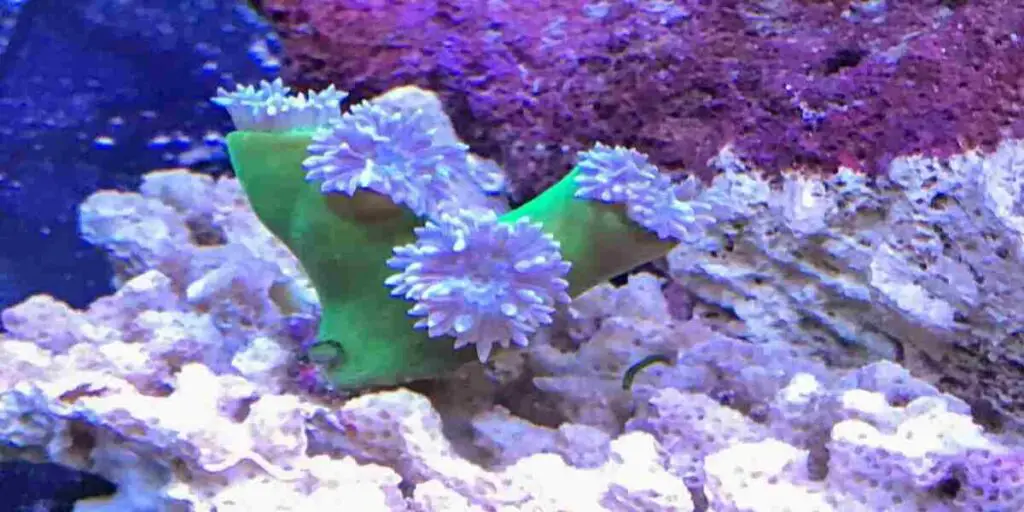Why your duncan coral not opening. Troubleshoot tips and solutions. Ensure your coral’s health and vibrancy. Explore now.

What is a Duncan Coral?
Duncan corals, scientifically known as Duncanopsammia axifuga, are captivating additions to saltwater aquariums and reef tanks. They belong to the family Dendrophylliidae and are often referred to as “Duncans” or “Whisker Corals.” These corals are highly sought after by aquarists due to their stunning appearance, ease of care, and fascinating behavior. Duncan corals feature long, flowing tentacles with polyps that extend during the day, creating a mesmerizing display of movement and color.
Why do Duncan Corals Close Up?
Duncan corals have a unique ability to open and close their polyps in response to various environmental factors and stressors. Understanding why they close up is crucial for their well-being. When a Duncan coral closes up, it typically retracts its tentacles and polyps into a protective state. This behavior can be triggered by a range of factors, including changes in water parameters, lighting, flow, and even the presence of pests or diseases.
Common Causes of Duncan Corals Not Opening
Duncan corals not opening can be a cause for concern among reef keepers. To address this issue effectively, it’s essential to identify the root causes. Let’s explore the most common reasons why Duncan corals may close up and how to address them:
Water Parameters:
Maintaining stable and appropriate water parameters is fundamental to the health and well-being of Duncan corals. Fluctuations or imbalances in these parameters can lead to stress and coral retraction.
Salinity:
Salinity refers to the concentration of salt in your aquarium water. Duncan corals thrive in saltwater environments with a specific gravity of around 1.024 to 1.026. Ensure your salinity levels remain stable to prevent stress-induced polyp retraction.
Temperature:
Maintaining the right temperature is crucial for coral health. Duncan corals prefer water temperatures in the range of 75°F to 80°F (24°C to 27°C). Rapid temperature fluctuations can cause them to close up, so use a reliable heater and monitor your tank’s temperature regularly.
pH:
Duncan corals thrive in slightly alkaline conditions, with pH levels between 8.2 and 8.4. Fluctuations in pH can stress corals, so regular testing and adjustments are essential.
Alkalinity, Calcium, and Magnesium:
These three parameters are interrelated and play a critical role in coral health. Maintain stable levels of alkalinity (8-12 dKH), calcium (400-450 ppm), and magnesium (1300-1400 ppm) through proper supplementation.
Nitrate and Phosphate:
High levels of nitrate and phosphate can lead to poor water quality and stress coral. Keep nitrate levels below 5 ppm and phosphate levels below 0.03 ppm through regular water changes and efficient filtration.
Lighting:
Proper lighting is vital for the photosynthesis and well-being of Duncan corals. Let’s explore the factors related to lighting that can cause them to close up.
Intensity:
Duncan corals prefer moderate to low light conditions. High-intensity lighting can stress them, leading to polyp retraction. Adjust the intensity or placement of your lighting to provide the ideal conditions for your corals.
Spectrum:
The spectrum of light your corals receive can impact their behavior. Duncan corals do well under a broad spectrum, including blue and violet wavelengths. Ensure your lighting system offers a balanced spectrum for optimal growth.
Photoperiod:
The duration of light exposure matters. Duncan corals require a consistent photoperiod of 8-10 hours per day. Avoid sudden changes in lighting schedules, as this can stress the corals and cause them to close up.
Flow:
Water flow within your aquarium is another critical factor that can affect Duncan coral behavior.
Strength:
Duncan corals prefer gentle to moderate water flow. High-flow areas can cause the corals to close up, while stagnant areas can lead to debris buildup. Adjust the flow rate to ensure even distribution of water throughout the tank.
Placement:
Proper placement of Duncan corals is essential. They should be positioned where they receive adequate flow without being directly in the path of strong currents, which can lead to polyp retraction.
Feeding:
Duncan corals are photosynthetic, but they also benefit from supplemental feeding.
Frequency:
Feed your Duncan corals with a combination of phytoplankton and zooplankton once or twice a week. Overfeeding can lead to nutrient imbalances and stress, so monitor their response and adjust feeding accordingly.
Food Types:
Variety is key when it comes to feeding. Offer a diverse diet to ensure your corals receive essential nutrients. Commercial coral foods and live or frozen plankton are excellent choices.
Pests and Diseases:
Unfortunately, Duncan corals can fall victim to common pests and diseases.
Common Pests and Diseases That Affect Duncan Corals:
- Aiptasia Anemones: These invasive anemones can harm Duncan corals by stinging their polyps. Remove Aiptasia promptly using appropriate methods.
- Brown Jelly Disease: This bacterial infection can cause tissue necrosis in corals. Isolate infected corals and treat with coral antibiotics.
- Flatworms and Red Bugs: These tiny parasites can irritate Duncan corals and lead to polyp retraction. Quarantine and treat affected corals if necessary.
Treatment Options:
If you suspect your Duncan corals are affected by pests or diseases, it’s crucial to act swiftly. Quarantine affected corals, and if necessary, consult with a marine biologist or experienced aquarist for guidance on specific treatments.
Also Read:
- Hole In Betta Fin: Causes, Symptoms, And Treatment
- Aqueon Filter Making Grinding Noise: Causes And Solutions
- Why Is My Fish Pooping Long Strings? Causes And Treatments
Conclusion:
In conclusion, understanding why Duncan corals close up and how to address this issue is essential for any reef keeper. By maintaining stable water parameters, providing appropriate lighting and flow, and offering the right feeding regimen, you can keep your Duncan corals healthy and thriving. Additionally, vigilance against pests and diseases is crucial to ensure their long-term well-being.